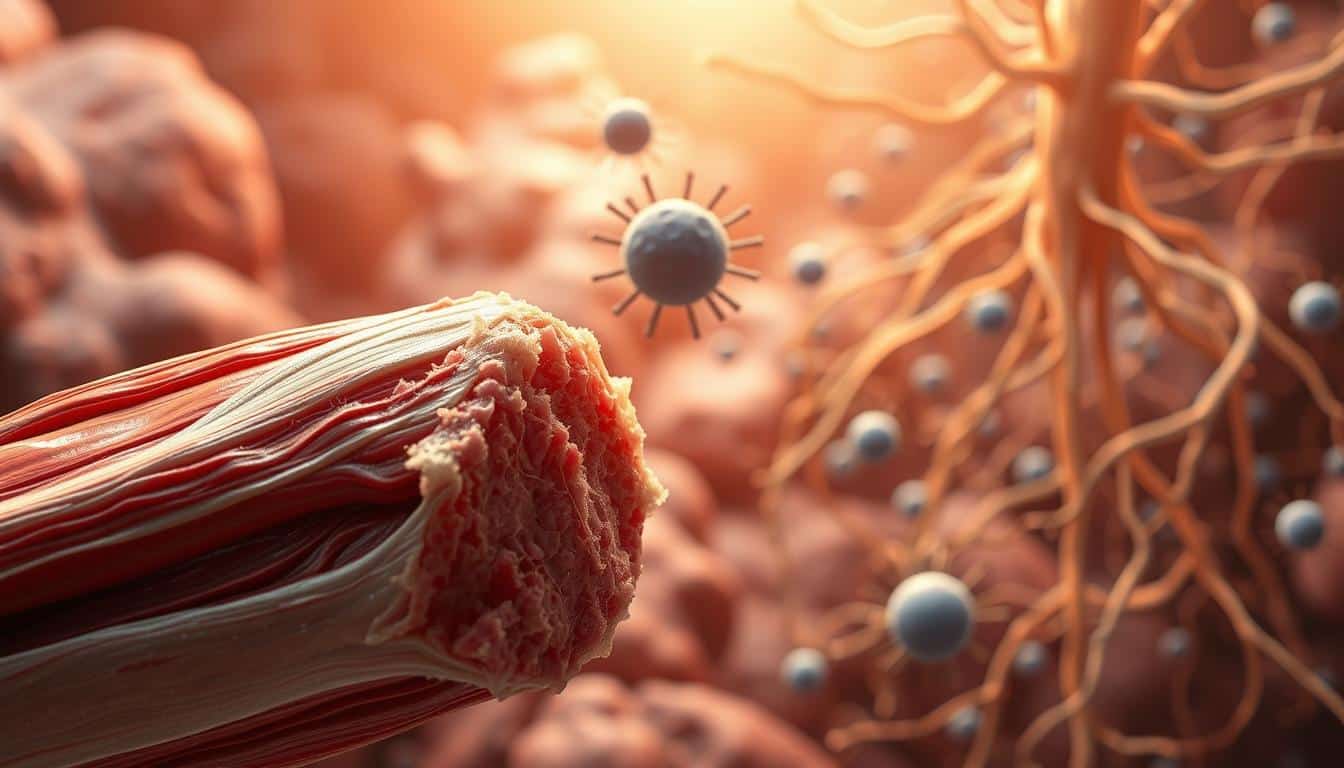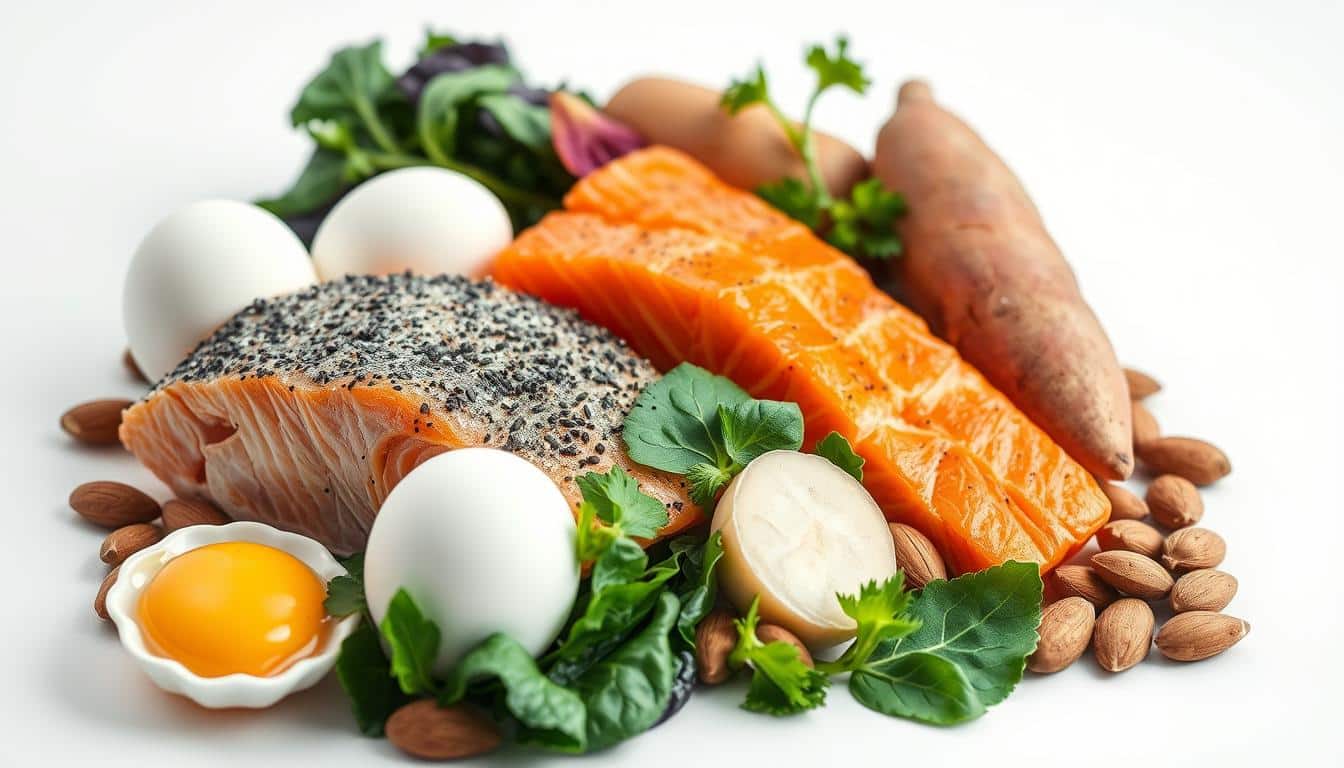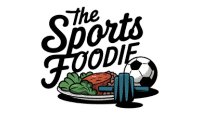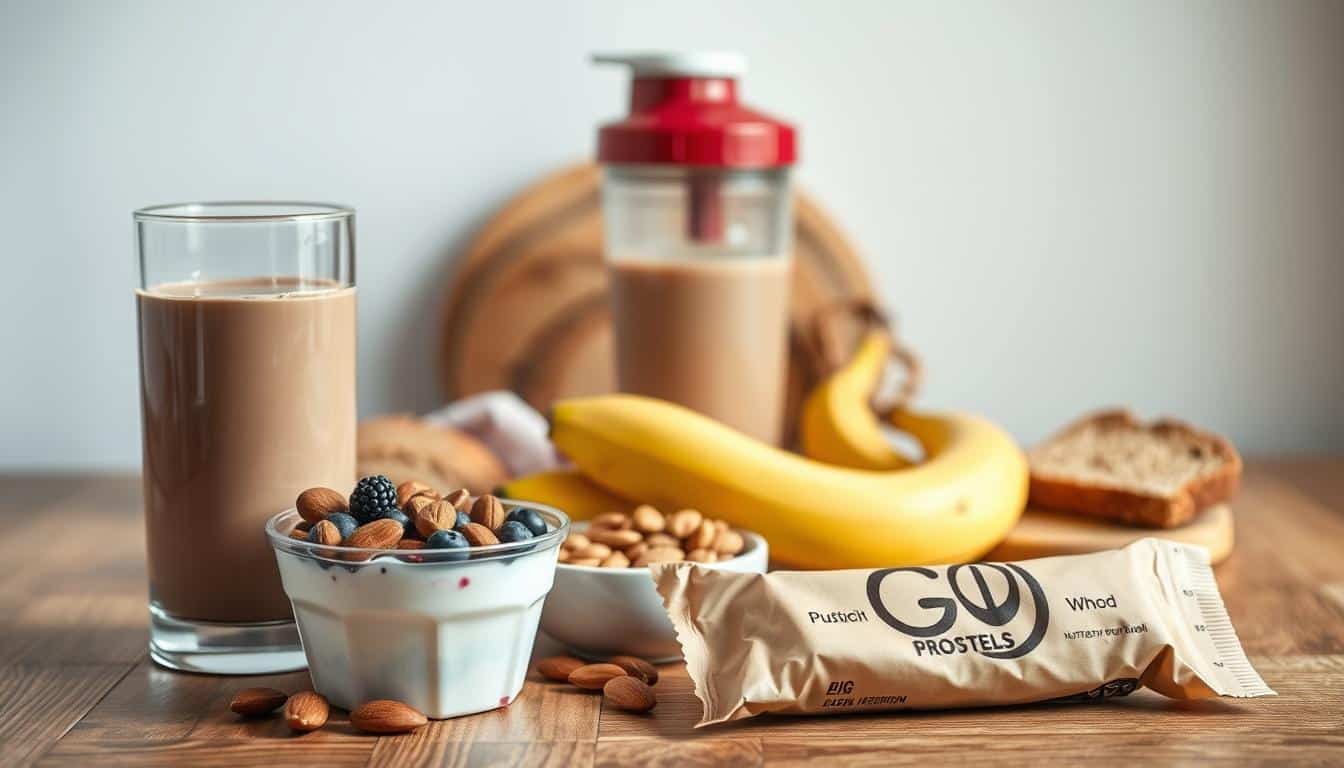Ever wonder why some people bounce back quickly after a tough workout while others feel sore for days? The secret might be in what they eat right after exercising. Post-workout nutrition plays a crucial role in helping your body rebuild and reduce soreness.
Certain foods are packed with nutrients like protein and amino acids, which are essential for repairing tissues. For example, bananas, berries, spinach, and eggs are excellent choices. They provide the fuel your body needs to recover effectively.
By making smart choices, you can support your body’s natural healing process and get back to your routine faster. Ready to learn more about the best options? Let’s dive in!
Understanding Muscle Recovery
Why do some people feel great after a workout while others struggle with soreness? The answer lies in how your body responds to exercise. When you push yourself during a workout, tiny tears form in your muscle fibers. This is a natural part of getting stronger, but it’s also what causes that post-exercise ache.

What Causes Muscle Soreness
Strenuous activities like lifting weights or running create microscopic damage in your muscles. This damage triggers inflammation, which leads to soreness. While it might feel uncomfortable, it’s a sign your body is adapting and building strength.
How Nutrition Aids Repair
What you eat after a workout plays a big role in how quickly you recover. Protein is essential because it provides the building blocks your body needs to repair those tiny tears. Carbohydrates are also important—they replenish energy stores and help your body use protein more effectively.
Timing matters too. Eating a balanced meal within a couple of hours post-workout can speed up the recovery process. Think of it as giving your body the tools it needs to rebuild and come back stronger.
Key Nutrients for Repair
What fuels your body’s ability to bounce back after intense physical activity? The answer lies in the right mix of nutrients. Certain elements are essential for rebuilding tissues and reducing inflammation. Let’s break down the key players.

Protein and Amino Acids
Protein is the building block your body needs to repair itself. It provides amino acids, which are crucial for rebuilding muscle fibers. Foods like eggs, cottage cheese, and lean meats are excellent sources. These options deliver the amino acids your body craves after a workout.
Timing matters too. Consuming protein within a couple of hours post-exercise maximizes its benefits. This helps your body kickstart the repair process and reduces soreness.
Vitamins and Minerals
Vitamins and minerals play a supportive role in recovery. Calcium and magnesium, for example, help maintain muscle function and reduce inflammation. Leafy greens and dairy products are packed with these essential nutrients.
Omega-3 fatty acids are another game-changer. Found in fish and flaxseeds, they help reduce inflammation and support joint health. Including these in your diet can make a noticeable difference in how you feel after intense activity.
By focusing on these key nutrients, you give your body the tools it needs to recover effectively. Pair them with a balanced diet, and you’ll be ready to tackle your next workout with confidence.
Benefits of Post-Workout Foods
Have you ever noticed how some people seem to recover faster after a workout while others take days to feel normal again? The secret often lies in what they eat right after exercising. Post-workout meals can make a big difference in how quickly your body bounces back.
Faster Recovery Time
Eating the right foods after a workout can speed up your recovery. Protein is key here. It provides the amino acids your body needs to repair damaged tissues. For example, eggs are a great source of high-quality protein. Pair them with carbohydrates like whole-grain toast to replenish energy stores.
Studies show that a balanced meal within two hours post-exercise can maximize recovery. A 3-to-1 ratio of carbs to protein is ideal. This means for every 20 grams of protein, aim for 60 grams of carbohydrates.
Reducing Muscle Soreness
Certain foods can also help reduce soreness. Vitamins and minerals play a big role here. For instance, foods rich in omega-3 fatty acids, like salmon or flaxseeds, can lower inflammation. Chocolate milk is another popular choice. It combines protein, carbs, and electrolytes to help your body recover faster.
Research suggests that branched-chain amino acids (BCAAs) can reduce soreness after intense workouts. Including these in your post-workout meal can make a noticeable difference.
| Food | Key Nutrient | Benefit |
|---|---|---|
| Eggs | Protein | Repairs damaged tissues |
| Chocolate Milk | Carbs & Protein | Replenishes energy, reduces soreness |
| Salmon | Omega-3 Fatty Acids | Lowers inflammation |
By choosing the right post-workout meal, you can support your body’s natural healing process. This helps you return to peak performance faster and with less discomfort. Try incorporating these foods into your routine and see the difference for yourself!
Top Food for Muscle Recovery and Repair
Have you ever considered how your post-workout meal choices impact your recovery? The right nutrients can make a big difference in how quickly your body bounces back. Whole, natural options are your best bet for reducing soreness and promoting repair.
Why Whole Foods Work Better
Whole foods like taro root, spinach, and bananas are packed with essential nutrients. They provide carbohydrates to replenish energy and amino acids to repair tissues. These options also contain anti-inflammatory properties, helping your body recover faster.
Processed foods, on the other hand, often lack these benefits. They can contain additives that increase inflammation and slow down the healing process. Choosing whole foods ensures you’re giving your body the fuel it needs to thrive.
- Taro Root: Rich in complex carbs and fiber, it helps restore energy levels.
- Spinach: Packed with vitamins and minerals, it reduces inflammation and supports repair.
- Bananas: High in potassium and carbs, they aid in muscle function and recovery.
By focusing on whole foods, you’re not just supporting recovery—you’re promoting overall health. Pair these with a balanced meal, and you’ll be ready to tackle your next workout with confidence.
Dairy and Alternative Protein Sources
What’s the secret to feeling strong and ready after a tough session? The answer often lies in what you eat afterward. Dairy and alternative protein sources like cottage cheese, yogurt, and eggs are backed by research as excellent options for supporting your body’s needs.
Cottage Cheese and Yogurt
Cottage cheese and yogurt are packed with high-quality protein. Cottage cheese offers a mix of whey and casein proteins, which are known for their slow and fast absorption rates. This makes them ideal for sustained nutrition over time.
Greek yogurt, in particular, is a standout. It contains about 13 grams of protein per cup, making it a great post-workout choice. Pair it with berries or a drizzle of honey for added carbs and flavor.
Eggs as a Protein Option
Eggs are a complete protein source, meaning they provide all the essential amino acids your body needs. One large egg contains about 6 grams of protein, making it a quick and easy option for any meal.
Studies show that consuming eggs post-workout can help with tissue repair. Try them scrambled, boiled, or in an omelet with veggies for a balanced mix of protein and carbs.
- Cottage Cheese: 12 grams of protein per half cup, perfect for sustained energy.
- Greek Yogurt: 13 grams of protein per cup, great for quick recovery.
- Eggs: 6 grams of protein each, versatile and easy to prepare.
Including these options in your post-workout routine can make a noticeable difference. They’re not just nutritious—they’re also convenient and delicious. Give them a try and see how they help you feel your best!
Nutrient-Dense Fruits and Vegetables
Looking for a natural way to boost your post-workout routine? Nutrient-dense fruits and vegetables can be your secret weapon. Packed with vitamins, minerals, and antioxidants, these options help your body bounce back faster and feel stronger.
Leafy Greens and Berries
Leafy greens like spinach and kale are powerhouses of nutrition. They’re rich in iron, magnesium, and vitamins C and K. These nutrients support oxygen delivery, reduce inflammation, and aid tissue repair. Spinach, for example, is a great snack to add to smoothies or salads.
Berries, especially blueberries, are loaded with antioxidants. They help combat oxidative stress and speed up recovery. A handful of berries makes a perfect post-workout snack or addition to your morning yogurt.
Sweet Potatoes and Watermelon
Sweet potatoes are a fantastic source of complex carbohydrates. They replenish energy stores and provide vitamin A, which supports immune function. Roast them for a quick and easy snack or side dish.
Watermelon is not only hydrating but also contains L-citrulline, which helps reduce soreness. It’s a refreshing drink or snack option, especially after a sweaty session.
| Food | Key Nutrient | Benefit |
|---|---|---|
| Spinach | Iron & Magnesium | Supports oxygen delivery, reduces inflammation |
| Blueberries | Antioxidants | Combats oxidative stress, speeds recovery |
| Sweet Potatoes | Complex Carbs & Vitamin A | Replenishes energy, supports immunity |
| Watermelon | L-Citrulline | Reduces soreness, hydrates |
Incorporating these nutrient-dense options into your diet can improve your overall intake of essential vitamins and minerals. They’re not just delicious—they’re also a smart way to support your body’s needs.
Hydration and Recovery Drinks
Ever thought about how the right drink can speed up your post-workout bounce-back? Staying hydrated is crucial, but what you drink matters just as much. The right beverages can replenish fluids, provide essential nutrients, and even reduce muscle soreness.
Chocolate Milk Benefits
Chocolate milk isn’t just a treat—it’s a recovery powerhouse. Studies show it offers a perfect mix of protein, carbohydrates, and electrolytes. This combination helps repair tissues, replenish energy, and restore hydration levels.
Its natural sweetness makes it a tasty option, while its nutrients make it effective. Plus, it’s easy to find and affordable, making it a practical choice for anyone looking to recover faster.
Smoothies and Natural Juices
Smoothies and natural juices are another great way to hydrate and refuel. Packed with fruit, they deliver antioxidants that combat oxidative stress. Adding ingredients like spinach or chia seeds boosts their nutrient profile even further.
These drinks are also versatile. You can customize them to fit your diet and taste preferences. Whether it’s a berry blend or a green juice, they’re a refreshing way to meet your post-workout needs.
Choosing the right drink can make a big difference in how you feel after exercise. From chocolate milk to smoothies, these options provide the hydration and nutrients your body craves. Try them out and see how they enhance your recovery!
Additional Recovery Tips
What else can you do to feel your best after a workout? While nutrition plays a big role, there are other ways to support your body. Active recovery, quality sleep, and even massages can make a difference. Let’s explore some practical tips to help you bounce back faster.
Active Recovery Methods
Active recovery involves light exercises that keep your body moving without overexertion. Cool-down routines, like stretching or yoga, can improve flexibility and reduce soreness. Even a short walk or swim can help.
Studies show that low-intensity activities promote blood flow, which aids in repair. Try incorporating these into your routine:
- Stretching: Focus on major muscle groups for 10-15 minutes post-workout.
- Swimming: A gentle swim can soothe tired muscles.
- Yoga: Enhances flexibility and relaxation.
Quality Sleep and Rest
Sleep is a game-changer for recovery. During rest, your body repairs tissues and balances hormones. Aim for 7-9 hours of quality sleep each night.
Research highlights that sleep deprivation can slow down the healing process. To improve sleep:
- Create a routine: Go to bed and wake up at the same time daily.
- Limit screens: Avoid phones and TVs an hour before bed.
- Stay hydrated: Drink water throughout the day, but reduce intake before bedtime.
Other recovery practices like massages and hydrotherapy can also help. Massages reduce tension and improve circulation, while hydrotherapy uses water to soothe muscles. A warm bath or cold plunge can work wonders.
| Recovery Method | Benefits |
|---|---|
| Active Recovery | Improves blood flow, reduces soreness |
| Quality Sleep | Supports tissue repair, balances hormones |
| Massages | Reduces tension, enhances circulation |
| Hydrotherapy | Soothes muscles, reduces inflammation |
Combining these tips with a balanced diet can maximize your results. Whether it’s a post-workout smoothie or a good night’s sleep, every step counts. Try these strategies and see how they fit into your routine!
Conclusion
Ready to take your post-workout routine to the next level? Proper nutrition plays a vital role in helping your body bounce back. Focus on whole, nutrient-rich options like cottage cheese, which provides steady protein release, and foods high in omega-3 fatty acids to reduce inflammation.
Don’t forget the importance of hydration and essential minerals like potassium. These elements work together to support your body’s natural processes. By making smart choices, you can enhance your performance and feel stronger every day.
Incorporate these tips into your routine and see the difference. Your body will thank you!


